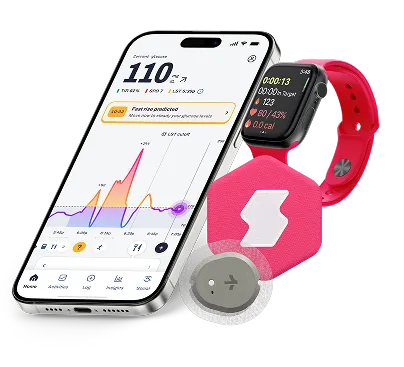Mango, known for its succulent sweetness and vibrant tropical flavor, is a beloved fruit worldwide, often associated with summer and exotic cuisines. Beyond its delicious taste, mangoes are rich in essential vitamins, minerals, and antioxidants, making them a valuable addition to any diet. Despite its natural sugars, research suggests that mangoes possess a moderate glycemic index, making them a potentially suitable fruit option for individuals managing their blood sugar levels.
A study published in Nutrients emphasizes that the fiber content in mangoes may contribute to their favorable glycemic response, aiding in better glucose regulation compared to other high-sugar fruits. Further exploring the intricate relationship between mango consumption, glycemic response, and its potential benefits for overall health forms the core of this discussion.
Sign up to be the first to know about special offers and exciting Signos news.
Glycemic Index Table
The nutritional content of 100 grams of mango consists of approximately 15 grams of carbohydrates.¹ With a glycemic index (GI) value ranging from 41 to 60, mangoes are considered to have a moderate GI, signifying that they may cause a moderate rise in blood sugar levels.² Additionally, the glycemic load (GL) per serving of mango, which considers both the quality and quantity of carbohydrates, is approximately 6, indicating a relatively low impact on blood glucose levels. It's important to note that the ripeness of the mango and its method of preparation, such as blending or juicing, can potentially affect its glycemic index by altering its fiber content and overall digestibility, thus influencing its impact on blood sugar levels.
Glycemic Index: 41 to 60 (Moderate)²
Carbohydrate per Serving (100g): 15g¹
Glycemic Load per Serving: 6 [Calculation: GI (average) * Carbohydrate per Serving / 100]
Understanding the glycemic index is crucial as it quantifies the rate at which a specific food raises blood sugar levels compared to pure glucose. Foods with a high glycemic index cause a rapid spike in blood sugar, while those with a low to moderate index are digested more slowly, leading to a steadier rise in blood sugar levels over time.

Nutritional Facts
Mangoes are not only renowned for their delectable taste but also for their rich nutritional profile. They are a rich source of vitamins and minerals, including vitamin C, vitamin A, and folate, which play crucial roles in immune function, vision health, and cell regeneration. Additionally, mangoes contain dietary fiber and antioxidants such as zeaxanthin and beta-carotene, which contribute to digestive health and offer protection against oxidative stress and inflammation.
The nutritional information below is for 100 g of mango.¹
Nutritional Facts

Is Mango Good for Weight Loss?
While mangoes are relatively high in natural sugars, they can still be beneficial to a weight loss diet when consumed mindfully and as part of a balanced meal plan. Mangoes are rich in dietary fiber, vitamins, and antioxidants, which can contribute to improved digestion, enhanced metabolism, and overall satiety, potentially aiding in weight management. Moreover, research suggests that the bioactive compounds in mangoes may have anti-obesity effects, promoting fat metabolism and reducing fat accumulation, although more extensive studies are required to substantiate these claims further.
Is Mango Safe for People Living with Diabetes?
Mangoes can be safely incorporated into the diet of individuals with diabetes when consumed in moderation, considering their moderate glycemic index and nutrient-dense properties. While mangoes contain natural sugars, their fiber content can potentially aid in regulating blood sugar levels and improving insulin sensitivity. Studies suggest that the polyphenols and bioactive compounds in mangoes may exert beneficial effects on blood glucose control and insulin secretion, contributing to improved glycemic control for individuals with diabetes. However, portion control and overall dietary balance remain crucial, and consult a healthcare provider or a registered dietitian is recommended for personalized dietary guidance.
Better health starts here.
Sign up for tips and insights that work for you!
Allergies
While mangoes are widely celebrated for their nutritional benefits, it's important to note that some individuals may experience allergic reactions to this fruit. Mango allergies are typically linked to the presence of urushiol, the same compound found in poison ivy and poison oak. Symptoms of mango allergies can range from mild oral allergic reactions, such as itching or swelling of the lips, to more severe systemic reactions like anaphylaxis, although such cases are relatively rare.

References
References
- USDA FoodData Central. (2022, October 28). Food Details - Mangos, raw. https://fdc.nal.usda.gov/fdc-app.html#/food-details/169910/nutrients
- The University of Sydney. (2023, May 1). Glycemic Index – Glycemic Index Research and GI News. https://glycemicindex.com/




.svg)
.svg)
.svg)
.svg)
.svg)
.svg)
.svg)
.svg)
